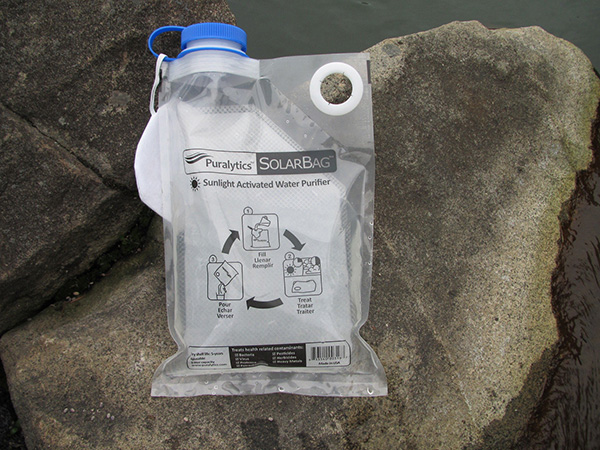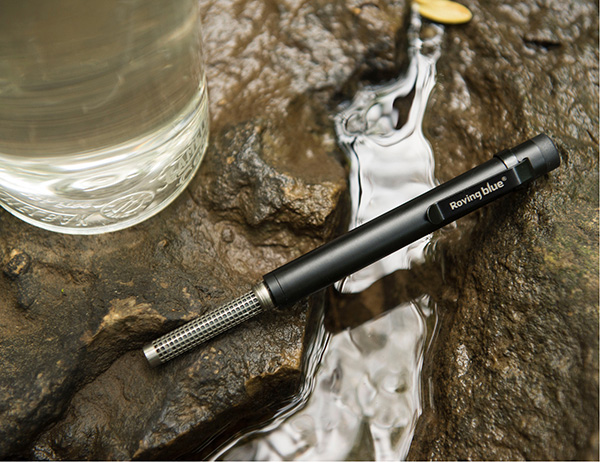Water is one of the most important considerations for the prepper. Water is life. Without water, there is no life – period. So, it only makes sense to ensure you have a steady supply of clean, safe drinking water. While we’ve discussed several filters of various kinds, there are other ways out there to purify drinking water, and we’ll discuss a couple of them here.
Puralytics

The Puralytics Solar bag is a new take on the SODIS method where the sun is used to kill off or destroy any contaminates. However, Puralytics takes things another step by adding what they call an Advanced Oxidation Process (AOP). Utilizing a proprietary catalyst material that reacts with sunlight to render your water safe to drink. This process removes volatile organic compounds, pesticides, pharmaceuticals, and other chemicals. The process also kills off pathogens in the process.
The bag treats three liters at a time and is reusable for hundreds of times. It is also the only non-mechanical or chemical filter to meet EPA standards. While the method of treatment is much like the SODIS method, the Puralytics bag does the same job in two to three hours versus eight for SODIS. The addition of the oxidizing membrane speeds up the process. This is an excellent filter for at home or even while traveling to keep in the hotel.
Because it must be kept in direct sunlight for a couple hours, it’s not the best filter for on the move situations. However, with no moving parts at all and nothing that needs to be added, it’s a great emergency filter that anyone can use.
Steripen
This one has been around for some time. The Steripen uses UV-C light to kill off microbes. And while we are all worried about pathogens from surface water sources, we also have to consider the potential for chemical contamination, and the Steripen does nothing for this last concern.
The folks at Steripen have spent a lot of time on marketing their products. A quick look at Amazon shows a variety of units in varying colors. The Ultra model uses a USB rechargeable battery to treat 32 oz of water in 90 seconds. You simply turn it on and place the lighted end into the water and stir. The LED screen will show you a smiley face when your water is ready. The battery is good for about fifty treatments before needing to be recharged. The LED is good for about 8,000 treatments.
This is a highly technical device. Not in its use, but its design. With batteries, LED’s and screens, there’s a lot that could go wrong with this unit. While it is simple to use, it also has the added benefit of treating water quickly and it not being boiling hot, the water is ready to drink immediately. I would consider this a backup or secondary treatment method, but that’s just me. I like things to be as simple as possible.
Roving Blue O-Pen

The O-Pen uses ozone to kill off microbes in water through a process called Lysis. The process is relatively simple and a lot like the Steripen. You press a button and insert the tip into your water. You’ll see a gas-like substance emitted from the tip, this is the ozone, simply stir it around to make sure everything is dead. The process of Lysis is pretty simple. The ozone attacks the cells of microbes, breaking them down. They essentially fall apart.
This is another unit that is USB rechargeable. The makers claim it will perform thirty treatments before needing to be charged. However, that is based on eight ounces of water. So, your typical Nalgene bottle will need about four treatments to get the job done. This device is designed more for folks that travel a lot and want to make sure none of the local pathogens get in their drinking water.
The unit is small and lightweight, looking a lot like an ordinary ink pen. That makes it easy to carry and means you will probably keep it with you, a significant pro. The con is, just like the Steripen, it does nothing for chemicals, and the fact they designed it around a mere eight ounces of water is a little small, in my opinion.
Roving Blue also has a larger unit designed for groups. This unit, the MVP, will treat up to 90,000 gallons before needing replacement of the elements. This would be an excellent option for large groups or fixed locations. It is not something you would use on the move as it is large and cumbersome. And with a price point of nearly $1,000, it’s not for most folks. Now, if you need to be sure your water is free of microbes and you’re not going to be moving around much, this would be a great unit for that.
Final Thoughts
There are many ways to treat water, from the chemical tabs to these technological marvels that can render water safe. I would recommend having some or all the various methods, from tabs and filters to the UV and Ozone generators. You never know where you’ll find yourself and just what sort of hazards you may be facing when it comes to hydration.

